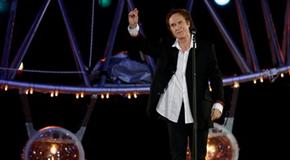Features
NBC Halts Olympics For Promotional Monkeyshines

During 16 days from London, the sprawl of Olympics coverage was seemingly indomitable, running roughshod across the NBC schedule. Yet Sunday’s package of highlights from the closing ceremony deferred meekly to the preview of a new NBC comedy, “Animal Practice,” which then was followed by a half-hour of local news.
When taped Olympics coverage came to an abrupt halt at 11 p.m. Eastern time, viewers were advised that the festivities would resume in one hour.
Accordingly, at midnight Ryan Seacrest greeted viewers who had chosen to stick around.
“Welcome to the London closing party,” he chirped. “Now it’s time for the big finale.”
That turned out to be a medley pounded out by The Who. Songs included such favorites as “Baba O’Riley” and “My Generation,” but not, as put-upon viewers might have noted, “Won’t Get Fooled Again”: Despite NBC’s build-up, The Who were on hand for just eight minutes.
Olympics host Bob Costas then delivered a rhapsodic postscript before declaring a wrap for NBC’s Olympics coverage at 12:35 a.m., while an interminable roster of program credits unfurled. For this, viewers had waited an extra hour on a work night.
And by then, many of them might have been wondering why the ceremony – which NBC boiled down by as much as an hour, entirely omitting acts like Muse, Kate Bush and Ray Davies – couldn’t at least have been presented in one block. It could have ended conveniently at 11:08 p.m. while only slightly delaying NBC’s monkey business.
NBC’s Olympics-embedded promotion of “Animal Practice” had already gotten the network into trouble.
On Aug. 3, the network apologized for airing an ad featuring Crystal, the show’s monkey, on gymnastic rings directly following a commentary by Costas where he suggested that Gabby Douglas’ gold medal might inspire other African-American girls to take up the sport.
“Much of America has fallen in love with Gabby Douglas,” Costas said. “Also safe to say that there are some young African-American girls out there who tonight are saying to themselves, ‘Hey, I’d like to try that, too.’“
Then NBC switched to the commercial with its small, widely grinning monkey on the rings. Blacks in the past have been disparagingly referred to as monkeys to the point where it is considered a common slur.
NBC said the timing of the ad was inadvertent, adding, “Certainly no offense was intended.”
Agitated viewers with a long memory were likening Sunday’s monkeyshines to NBC’s “Heidi” moment nearly four decades earlier.
That was the faceoff between the Oakland Raiders and the New York Jets on Nov. 17, 1968, when Oakland scored two touchdowns in the game’s final minute to overwhelm New York’s 32-29 lead. But viewers in the East didn’t see the impossible comeback, because NBC broke away from the game with the Jets still ahead to air its TV film “Heidi” at the scheduled 7 p.m. start time.
Back then there was no Twitter, but Sunday night there was – and it lit up with complaints.
“No better way to turn people off a new show than to preempt the who & other rock legends for it,” tweeted Nate Barlow.
And Nina L. Diamond voiced her ire in even stronger terms: “I think NBC has managed to become even less popular than Congress.”